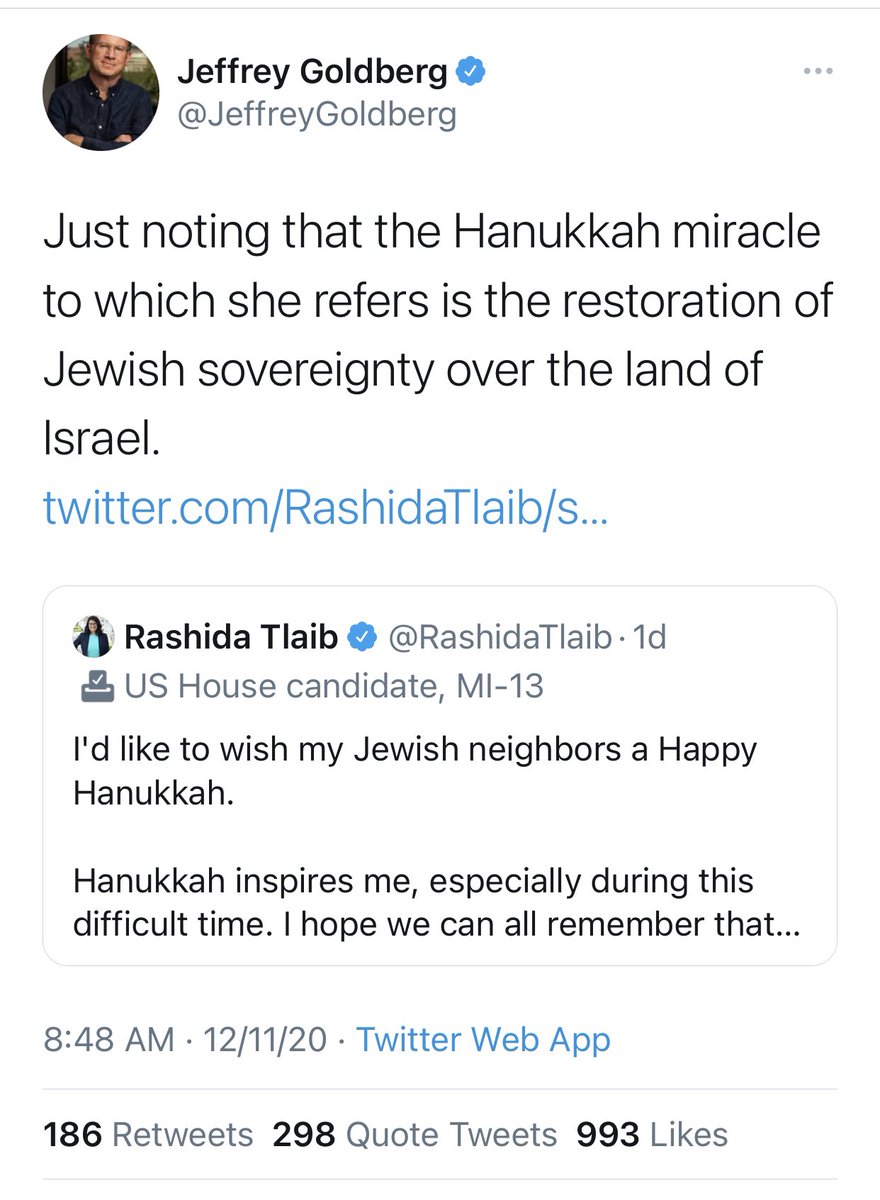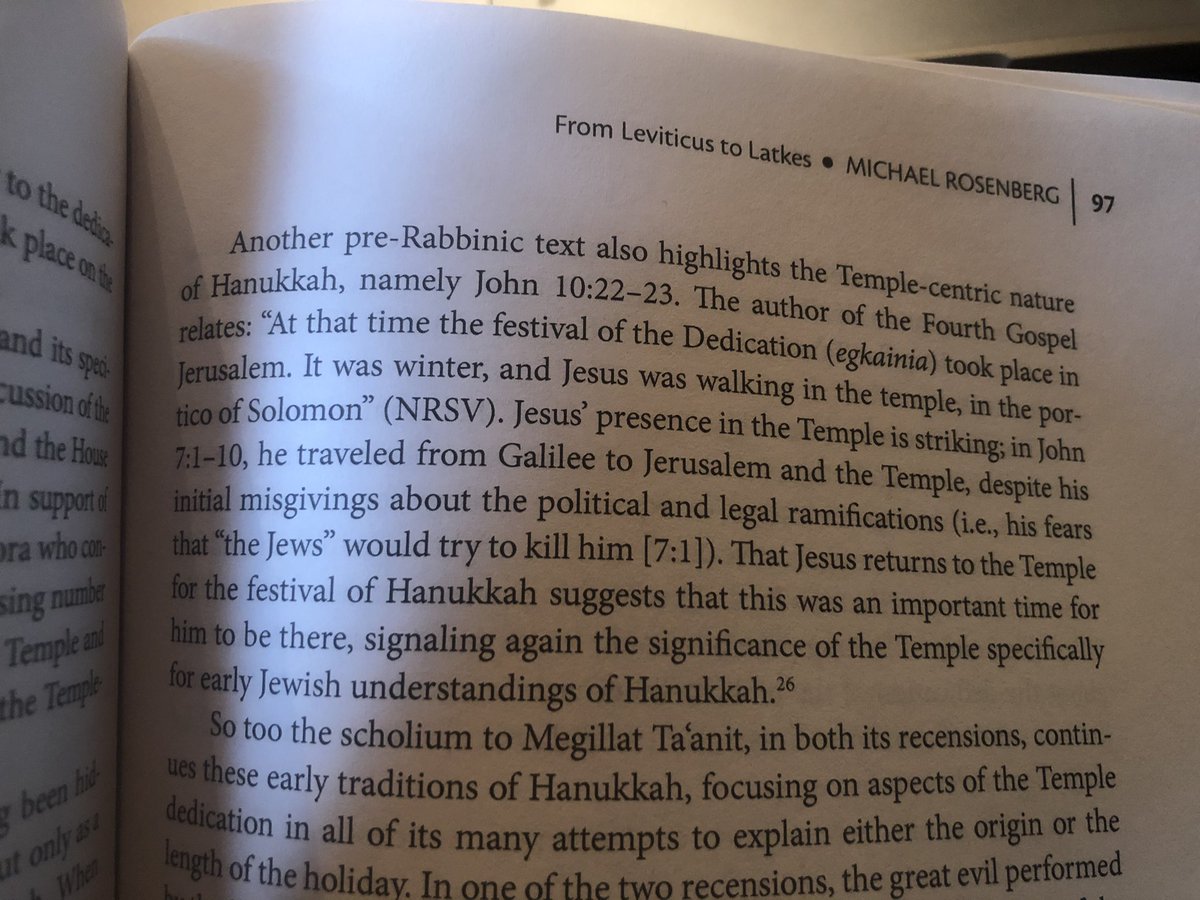As someone writing a book on forgetting in post-70 reception of 2nd Temple Judaism, I'm finding recent debates about "real" meaning of Hanukkah really fascinating--so a thread of some preliminary ponderings on what/how Jewish tradition forgets about this ancient Jewish festival +
The master of Jewish history Twitter threads, @Simcha_Gross, has already masterly traced the lack of early evidence for the miracle of the oil as well as tweeting on the fascinating Scroll of Antiochus + https://twitter.com/Simcha_Gross/status/1338113206557011974?s=20
And @candidamoss has written on Catherine Bonesho's @catebosh's important findings about the broader Hellenistic and Roman contexts in which this ostensibly anti-Hellenistic/particularistic festival emerged + https://www.thedailybeast.com/did-ancient-jews-change-hanukkah-to-one-up-the-competition
It comes as no surprise to scholars of ReligiousStudies, of course, that explanations of the meaning of Hanukkah are diverse & change over time. The particular change that I find esp fascinating, though, relates to the question of whether/when it is "really" about nationalism +
Late antique Rabbis don't seem particularly interested in imputing nationalistic/militaristic meaning to Hanukkah as a festival celebrating Maccabean victory over "Greeks" (i.e. Seleucids) and/or the restoration of native rule to Israel. But were they suppressing earlier views? +
This ends up being an interesting question thru which to read our earliest references to Hanukkah, as preserved in 1-2 Maccabees--since the militaristic/ethno-nationalistic themes one would expect to find in their treatments of the festival are actually surprisingly absent +
What is striking about the treatments of the festival in 1-2 Maccabees is the emphasis on the Temple + the framing of what is commemorated as foremost the purification of Temple, re-dedication of altar, & restoration of sacrifices, as well as its depiction as a second Sukkot +
In the first letter prefaced to 2Macc (1:1-9), there dated 124 BCE, the events commemorated are telegraphically described in totally Templecentric fashion: high priest Jason foments trouble/violence, but sacrifice is restored due to prayers of other Jews +
Restoration of Temple sacrifice here seems to suffice as a miraculous event to commemorate--a possibility that proves esp poignant if we read this terse account against the background of John Ma's @Nakhthor alternate reconstruction of the Macc Revolt + https://marginalia.lareviewofbooks.org/re-examining-hanukkah/
The 2nd letter in 2Macc (1:10-2:18) notes how God "drove out those who fought against the holy city" & celebrates Antiochus IV's death in Persia, but the focus of the explanation of the festival is still on the Temple, esp. altar purification and restoration of its fire +
To be sure, 2Macc 2:17 does credit God for a restoration of Israel's inheritance that includes "kingship" alongside "priesthood and consecration"--but this is in a concluding section about what God has & will do, which isn't as clearly an explanation of Hanukkah +
Most of this second letter, in fact, aims to parallel the rededication of the altar under Judas Maccabees w/its dedication by Nehemiah--paralleling their library-founding as well as suggesting that the fire restored is, thanks to naphtha, the same fire +
The rest of 2Macc is famously centered on the Temple, even as it tells of the Maccabees, & the account in 2Macc 10 follows much the same pattern, subordinating the celebration of military victory to the Temple restoration that was thereby enabled +
What is striking too is that this is even the case of the treatment of Hanukkah w/in the pro-Hasmonean 1 Maccabees (4:52-59)--there emphasizing that what was celebrated "w/songs and harps and lutes and cymbals" was the "dedication of the altar" & the restoration of the Temple +
What, then, might this tell us about forgetting? It's tempting to see Rabbinic Hanukkah as post-70 forgetting of Maccabean military might & Hasmonean rulership in the shadow of failures of two Jewish revolts against Rome. But it is not clear that the story is quite so simple +
What is forgotten, instead, is perhaps a world in which the Temple & its sacrifices were so central to Jews. Rereading 1-2 Macc after reading @lianemfeldman's book *Story of Sacrifice*, e.g., I noticed many resonances w/P's tabernacle purification/altar dedication narratives +
. @lianemfeldman there recovers what past research has sidelined abt centrality of sacrificial ritual instructions to P's narrative. One sees something similar in modern reception (scholarly+popular) of accounts of Hanukkah in 1-2 Macc--which tend not to take sacrifice seriously +
From post-70 perspectives, it may be hard to imagine how the restoration of sacrifice might have sufficed as a miracle to celebrate, and from a modern perspective, it may be hard to imagine that military success would not have necessarily been what was deemed "really" important +
At least since Heinrich Graetz in 19thC, one finds a rereading of 1-2 Maccabees & Josephus in nationalistic terms. Even as we know Hasmoneans were not "autonomous" & their story isn't quite one of "Jewish sovereignty," the trope of "restoring native rule" is commonplace now +
What's interesting, though, is that Rabbinic view is thus not as far from pre-Rabbinic views as is often assumed--and, here as elsewhere, the notion of a contrast between a "real" political motive VS. a religious interpretation may say more about the present than about the past +
By all this, I don't mean to imply that the earliest attestations convey some singular true meaning. They do, however, draw attention to range of past interpretations & point to some of wht is lost when Hanukkah is reduced to those particular meanings that make sense in modernity
For more on Rabbinic etiology, read less as an inventive innovation & more as a creative synthesis of earlier traditions, see now Michael Rosenberg @rosenfish, "From Leviticus to Latkes: Origins of Hanukkah’s Miraculous Oil & Meaning of the Festival"
https://www.degruyter.tools/document/doi/10.1515/9781644690208-005/html
https://www.degruyter.tools/document/doi/10.1515/9781644690208-005/html
Rosenberg’s superb article on Hanukkah (in 2019 Nehemia Polen FS Be-Ron Yahad) also emphasizes prominence of Temple throughout early traditions—incl in Gospel of John (10:22-23)! @rosenfish

 Read on Twitter
Read on Twitter



